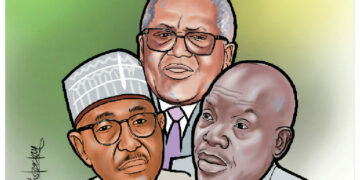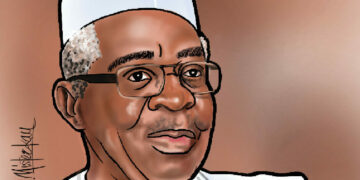Cement and concrete are synonymous with strength ;the strength of the economy and infrastructural development. Cement is specifically an indicator of how we prioritise housing, roads, and other infrastructure projects that rely on it. When cement prices go up consistently, it reverberates across the country, sending cold chills down the spines of many. It means fewer people can afford homes, a fundamental human right. Although cement is just one ingredient in the construction industry, it has come to represent the industry itself, so the affordability of cement represents the affordability of houses and other concrete-based constructions. To millions of Nigerians who are nursing the hope of owning their own homes, an increase in the price of cement threatens that hope, and in a country where hope is the only viable anchor against many debilitating odds, there is outrage and panic among many. Besides the link of cement to our collective psyche of home ownership, cement is also about the construction industry, public works, local manufacturing industry, and the employment it generates.
Cement And Economic Mix
The current cement price hike is indicative of the economic degradation of Nigeria and the complexity therein. It showcases the interconnectivity of a nexus of factors that come together to have a stranglehold on our economy and how the government tackles the problem of excessive hikes in cement prices often is a case study of the government’s dominant reactionary approach to solving sensitive social issues and a metaphor for wrong application of policy in our society. It also indicates how the government misdiagnoses problems and applies inappropriate treatment at the policy level.
In a mixed economy like ours, the government plays a crucial role in shaping the economy, and in some cases, it is the highest single stakeholder in some sectors of the economy. Nevertheless, its primary role is to create an enabling environment for the market forces to play their role in determining the cement price while ensuring that the regulatory framework constrains the market arbitrariness. This is more preventive than reactionary. However, when the systems and structures put in place to guide the market fail, the government is expected to intervene in the interest of society. This intervention must aim to produce public value by diagnosing and solving problems appropriately. Appropriate diagnoses are pivotal to applying the correct measures that bring sustainable solutions. We miss the point when government officials act like elected kings, using maximum coercive powers to solve a problem that requires thinking and collaboration. Cement is a case in point.
The price of cement, using a 50kg bag as an indicator, between May 2023 and January 2024, a period of about six months, has increased from N4,250-N4,500 to N12,000-N13,000. This is an increase of between 100% to 200%. Almost all construction industry segments reacted to this astronomical rise in price. There was a public uproar, and the government applied two knee-jerk reactions: the first was to threaten the cement producers to bring down prices or face dire consequences and the second was a threat to open the borders and allow massive importation of cement to flood the market and force the price down. This is indicative of the mindset of our government officials. But realistically, we cannot solve problems by threatening everybody.
The most critical underlying factor in the cement price hike albatross is that the government is caught between protectionism (protecting the local cement industry) and trade liberalisation to curtail prices. The politics of the recent cement price hike goes beyond the fractures in the Nigerian economy. There is a perception of the politics of cement monopoly. The Obasanjo presidency initiated a policy of selective protectionism on certain items to protect local industries. Things like cement, fruit juice drinks, pasta and sugar benefited. This enabled significant industrialists to set up enormous plants for these items. There was an unwritten understanding behind these concessions about these local investors reciprocating by keeping prices in check. This is another dimension of the challenge that the government needs to untangle.
The Why Of Price Hike
Cement manufacturers have raised fundamental issues that need appropriate diagnosis and solutions proffered. Issues raised by cement manufacturers are grouped into 5: first, with the general paucity of power in Nigeria, almost all manufacturers generate their own energy, and many rely on gas. Despite being a gas-endowed nation, it is simply unavailable – a paradox of plenty. The available gas is denominated in USD and the price has increased by over 300% in the past 6 months. Second, Cement production relies on many imported inputs such as gypsum, machinery, explosives to blast the mines, spare parts, and propylene to produce bags, all of which are imported using USD. The foreign exchange is just not available, and the USD volatility against the Naira has not helped matters. Third, customs duties are indexed in USD, and lately, it has moved from 450/USD to 1700/USD in just a few months, a more than 300% increase. Fourth, the cost of diesel, which is critical in the transportation of cement and for excavators to mine limestone, has tripled over three months. Fifth, the unfriendly operating environment characterised by corruption, strangulating bureaucracy and multiple taxation is devastatingly affecting the industry.
All Hands Must Be On Deck
Addressing this issue requires a comprehensive approach involving various stakeholders. A starting point for diagnosis of the challenge is to find out why gas is not available, why we cannot transport cement by rail, what can be done on the matter of foreign exchange components in the cement production sector, tax harmonization, general insecurity, and undue bureaucratic interference to complex issues of market forces. Any solution that does not address these is, at best, jaundiced and unsustainable. It is myopic to think that the government will ignore the significant external and internal intervening variables underpinning the excessive hike in the price of cement, whip the industry to an agreeable price, and assume the problem has been solved.
All factors considered, because of the socio-economic impact of cement, the government needed to diagnose the challenge correctly, consult widely, and develop a sustainable policy solution. The impression I get is that this is not the case . The way we are going, many manufacturing concerns in the country will go down unless something is done about FX, operating environment, import duty, power and, most importantly, corruption. If cement prices continue to skyrocket, the cost of public infrastructure will escalate, many will lose their jobs, and the nation will be thrown into further economic depression. There may not be a straight answer to resolving the paradox of cement price hikes, but it is urgent and imperative that a holistic approach to tackling the problem is followed.
Addressing the high cost of cement requires collaboration between the government, industry players, and other stakeholders to implement sustainable and practical solutions. The government must work with the cement industry to develop policies that stabilise prices and prevent unnecessary fluctuations. It must enforce policies that ensure fair competition and avoid price gouging. It should encourage healthy competition in the cement industry,prevent monopolies, and streamline the regulatory processes. It should invest in infrastructure development to improve transportation networks and reduce the cost of transporting raw materials and finished products. Put mildly, the government must create an external environment that is business-friendly.
The cement industry on the other hand must implement energy-efficient technologies to reduce operational costs and explore alternative and renewable energy sources to power manufacturing plants. They should invest in research and development to find innovative and cost-effective methods for cement production .




